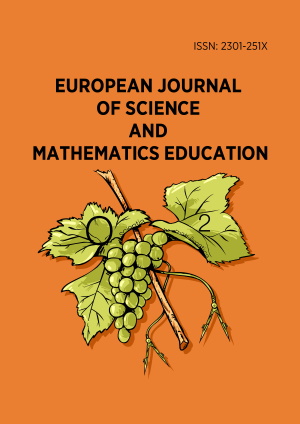Research Article
Impact of a mathematical pre-course on first-year physics students
More Detail
1 Institute for Didactics of Physics, Leipzig University, Leipzig, GERMANY* Corresponding Author
European Journal of Science and Mathematics Education, 13(3), July 2025, 172-190, https://doi.org/10.30935/scimath/16363
Published Online: 09 May 2025, Published: 01 July 2025
OPEN ACCESS 2905 Views 1408 Downloads
ABSTRACT
The transition from school-level mathematics to the more abstract and formal structures in universities poses challenges for many first-year physics students. To address this gap, most physics faculties offer a mathematics pre-course. Here, we report about a pre-posttest study investigating the impact of a pre-course on N = 56 first-year physics students at the Leipzig University. The according tests were conducted in October 2022, which were correlated to the subsequent first and second-semester exam results. Thus, the research focused on measuring the knowledge gain and changes in mathematical abilities before and after the pre-course as well as the resulting medium-term effects. The results show a significant improvement in the math skills of the participants in the pre-course, especially among participants with intermediate prior knowledge. Additionally, the study reveals a correlation between the level of school mathematics instruction and learning success in the pre-course. Medium-term effects revealed that pre-course participants displayed higher pass rates and better grades, particularly in modules directly influenced by pre-course contents. This research underlines the effectiveness of the pre-course in mathematics in improving and reactivating the mathematical skills of first-year physics students.
CITATION (APA)
Gleichmann, J., Kubitschke, H., & Schnauß, J. (2025). Impact of a mathematical pre-course on first-year physics students. European Journal of Science and Mathematics Education, 13(3), 172-190. https://doi.org/10.30935/scimath/16363
REFERENCES
- Almeida, D. (2000). A survey of mathematics undergraduates’ interaction with proof: Some implications for mathematics education. International Journal of Mathematical Education in Science and Technology, 31(6), 869–890. https://doi.org/10.1080/00207390050203360
- Bausch, I., Biehler, R., Bruder, R., Fischer, P. R., Hochmuth, R., Koepf, W., & Wassong, T. (2014). VEMINT – Interaktives Lernmaterial für mathematische Vor- und Brückenkurse [VEMINT – Interactive learning material for mathematical preparatory and bridging courses]. In I. Bausch et al. (Eds.), Mathematische Vor- und Brückenkurse. Konzepte und Studien zur Hochschuldidaktik und Lehrerbildung Mathematik (pp. 261–276). Springer. https://doi.org/10.1007/978-3-658-03065-0_18
- Biehler, R., Fischer, P. R., Hochmuth, R., & Wassong, T. (2011). Designing and evaluating blended learning bridging courses in mathematics. University of Rzeszów.
- Buschhüter, D., Spoden, C., & Borowski, A. (2016). Mathematische Kenntnisse und Fähigkeiten von Physikstudierenden zu Studienbeginn [Mathematical knowledge and skills of physics students at the beginning of their studies]. Zeitschrift für Didaktik der Naturwissenschaften, 22(1), 61–75. https://doi.org/10.1007/s40573-016-0041-4
- Cohen, J. (1960). A coefficient of agreement for nominal scales. Educational and Psychological Measurement, 20(1), 37–46. https://doi.org/10.1177/001316446002000104
- Cohen, J. (1988). Statistical power analysis for the behavioral sciences (2nd ed.). Routledge. https://doi.org/10.4324/9780203771587
- Coletta, V. P., Phillips, J. A., & Steinert, J. J. (2007). Interpreting force concept inventory scores: Normalized gain and SAT scores. Physical Review Physics Education Research, 3, Article 010106. https://doi.org/10.1103/PhysRevSTPER.3.010106
- de Guzmán, M., Hodgson, B. R., Robert, A., & Villani, V. (1998). Difficulties in the passage from secondary to tertiary education. Documenta Mathematica, 1998, 747–762. https://doi.org/10.4171/dms/1-3/72
- Deeken, C., Neumann, I., & Heinze, A. (2020). Mathematical prerequisites for STEM programs: What do university instructors expect from new STEM undergraduates? International Journal of Research in Undergraduate Mathematics Education, 6, 23–41. https://doi.org/10.1007/s40753-019-00098-1
- Department for Education. (2021). National curriculum in England: Mathematics programmes of study. GOV.UK. https://www.gov.uk/government/publications/national-curriculum-in-england-mathematics-programmes-of-study/national-curriculum-in-england-mathematics-programmes-of-study
- Derr, K., Hübl, R., & Ahmed, M. Z. (2018). Prior knowledge in mathematics and study success in engineering: Informational value of learner data collected from a web-based pre-course. European Journal of Engineering Education, 43(6), 911–926. https://doi.org/10.1080/03043797.2018.1462765
- Engzell, P., Frey, A., & Verhagen, M. D. (2021). Learning loss due to school closures during the COVID-19 pandemic. PNAS, 118(17), Article e2022379118. https://doi.org/10.1073/pnas.2022376118
- Gahrmann, D., Borowski, A., & Neumann, I. (2023). Höhere mathematische Komplexität in der Studieneingangsphase? In Proceedings of the Annual Conference of the Society for Chemistry and Physics Education (pp. 567–570).
- Galligan, L. (2004). Preparing international students for university: Mathematics as part of an integrated program. Australian Senior Mathematics Journal, 18(1), 28–41.
- Greefrath, G., & Hoever, G. (2016). Was bewirken Mathematik-Vorkurse? Eine Untersuchung zum Studienerfolg nach Vorkursteilnahme an der FH Aachen [What effect do mathematics preparatory courses have? A study on academic success after participation in a preparatory course at the FH Aachen]. In A. Hoppenbrock, R. Biehler, R. Hochmuth, & H. G. Rück (Eds.), Lehren und Lernen von Mathematik in der Studieneingangsphase. Konzepte und Studien zur Hochschuldidaktik und Lehrerbildung Mathematik (pp. 517–530). Springer. https://doi.org/10.1007/978-3-658-10261-6_33
- Gregory, R. (2013). Psychological testing: History, principles, and applications (7th ed.). Pearson.
- Hake, R. R. (1998). Interactive-engagement versus traditional methods: A six-thousand-student survey of mechanics test data for introductory physics courses. American Journal of Physics, 66(1), 64–74. https://doi.org/10.1119/1.18809
- Hazari, Z., Tai, R. H., & Sadler, P. M. (2007). Gender differences in introductory university physics performance: The influence of high school physics preparation and affective factors. Science Education, 91(6), 847–876. https://doi.org/10.1002/sce.20223
- Heinze, A., Neumann, I., Ufer, S., Rach, S., Borowski, A., Buschhüter, D., Greefrath, G., Halverscheid, S., Kürten, R., Pustelnik, K., & Sommerhoff, D. (2020). Mathematische Kenntnisse in der Studieneingangsphase – Was messen unsere Tests? [Mathematical skills in the initial phase of study – What do our tests measure?]. In A. Frank, S. Krauss, & K. Binder (Eds.), Beiträge zum Mathematikunterricht 2019 (pp. 345–348). Gesellschaft für Didaktik der Mathematik. https://doi.org/10.17877/DE290R-20862
- Herzog, A. R., & Bachman, J. G. (1981). Effects of questionnaire length on response quality. Public Opinion Quarterly, 45(4), 549–559. https://doi.org/10.1086/268687
- Holton, D. (2001). The teaching and learning of mathematics at university level. An ICMI study. Kluwer. https://doi.org/10.1007/0-306-47231-7
- Hudson, H. T., & McIntire, W. R. (1977). Correlation between mathematical skills and success in physics. American Journal of Physics, 45(5), 470–471. https://doi.org/10.1119/1.10823
- Hudson, H. T., & Rottmann, R. M. (1981). Correlation between performance in physics and prior mathematics knowledge. Journal of Research in Science Teaching, 18(4), 291–294. https://doi.org/10.1002/tea.3660180403
- Johnson, P., & O’Keeffe, L. (2016). The effect of a pre-university mathematics bridging course on adult learners’ self-efficacy and retention rates in STEM subjects. Irish Educational Studies, 35(3), 233–248. https://doi.org/10.1080/03323315.2016.1192481
- Konferenz der Fachbereiche Physik. (2011). Empfehlung der Konferenz der Fachbereiche Physik zum Umgang mit den Mathematikkenntnissen von Studienanfängern der Physik [Recommendation of the conference of physics departments on dealing with the mathematical knowledge of first-year physics students]. KFP. https://www.kfp-physik.de/dokument/KFP-Empfehlung-Mathematikkenntnisse.pdf
- Krause, F., & Reiners-Logothetidou, A. (1981). Folgerungen aus dem Studieneingangstest Physik 1978: Vorschläge zum Abbau der festgestellten Defizite [Conclusions from the 1978 physics entrance test: Suggestions for reducing the identified deficits]. Physikalische Blätter, 37(9), 295–299. https://doi.org/10.1002/phbl.19810370911
- Krosnick, J. A. (1991). Response strategies for coping with the cognitive demands of attitude measures in surveys. Applied Cognitive Psychology, 5(3), 213–236. https://doi.org/10.1002/acp.2350050305
- Kruger, J., & Dunning, D. (1999). Unskilled and unaware of it: How difficulties in recognizing one’s own incompetence lead to inflated self-assessments. Journal of Personality and Social Psychology, 77(6), 1121–1134. https://doi.org/10.1037/0022-3514.77.6.1121
- Leviatan, T. (2008). Bridging a cultural gap. Mathematics Education Research Journal, 20(2), 105–116. https://doi.org/10.1007/BF03217480
- Nasir, A. M., Omar, N. A. B., Sarudin, E. S. B., Masrom, S., & Ahmad, N. H. (2018). Teaching and learning of pre-calculus: An insights of educators. Journal of Fundamental and Applied Sciences, 9(6S), 452–467. https://doi.org/10.4314/jfas.v9i6s.35
- Nunnally, J. C., & Bernstein, I. H. (1994). Psychometric theory. McGraw-Hill. https://doi.org/10.1007/BF02301419
- Nurjannah, S., & Kusnandi. (2021). Literature study: The role of abstraction ability to strengthen students early knowledge in mathematics learning. Journal of Physics: Conference Series, 1806, Article 012064. https://doi.org/10.1088/1742-6596/1806/1/012064
- Okey, I. F., & Charles-Ogan, G. (2017). Effects of mathematics knowledge on physics students performance in electromagnetism. Journal of Education and Leadership Development, 7(1), 36–49.
- Popanao, M., Smith, M. F., & Pairor, P. (2023). Analyzing pre-instruction math knowledge and its correlation with introductory physics exam results. Journal of Physics: Conference Series, 2431, Article 012026. https://doi.org/10.1088/1742-6596/2431/1/012026
- Rach, S., Sommerhoff, D., & Ufer, S. (2021). KUM/MOAS: Technical report - Knowledge for university mathematics (KUM) and mathematics online assessment system (MOAS). Munich Center of the Learning Sciences. https://doi.org/10.5282/ubm/epub.76294
- Sangwin, C. (2013). Computer aided assessment of mathematics using stack. Oxford University Press. https://doi.org/10.1093/acprof:oso/9780199660353.001.0001
- Solomon, R. L. (1949). An extension of control group design. Psychological Bulletin, 46(2), 137–150. https://doi.org/10.1037/h0062958
- Tall, D. (1992). The transition to advanced mathematical thinking: Functions, limits, infinity and proof. In D. A. Grouws (Ed.), Handbook of research on mathematics teaching and learning (pp. 495–511). Macmillan Library Reference.
- Tan, U.-X., Zhu, Y., Lee, C. H., Toh, T. L., Sze, G. K., Tay, S.Wong, D., & Pey, K. L. (2017). Preliminary study of integrated physics and mathematics bridging course. In Proceedings of the IEEE Global Engineering Education Conference (pp. 1146–1151). IEEE. https://doi.org/10.1109/EDUCON.2017.7942993
- Trapmann, S., Hell, B., Weigand, S., & Schuler, H. (2007). Die Validität von Schulnoten zur Vorhersage des Studienerfols - eine Metaanalyse [The validity of school grades in predicting academic success - A meta-analysis]. Zeitschrift für Pädagogische Psychologie, 21(1), 11–27. https://doi.org/10.1024/1010-0652.21.1.11


 The articles published in this journal are licensed under the CC-BY Creative Commons Attribution International License.
The articles published in this journal are licensed under the CC-BY Creative Commons Attribution International License.